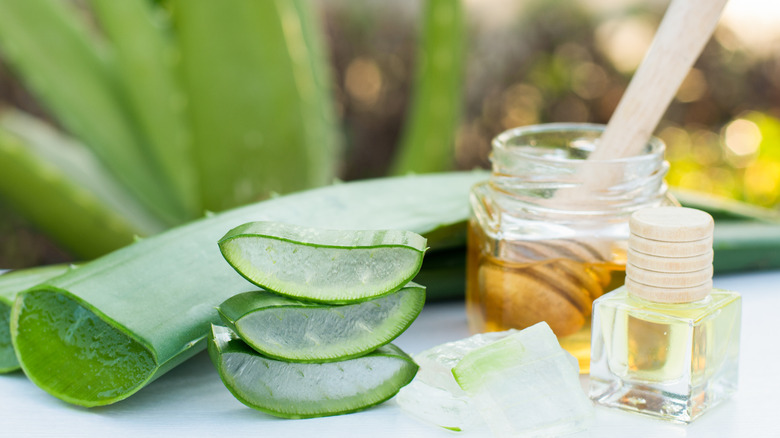Are Natural Ingredients Better For Your Skin?
Many of us feel the quest for clear, smooth skin never ends. In fact, it can feel like the skincare industry is continually pushing out new "must-try" products and "life-changing" hacks that promise to transform our skin for good — but the reality is that beneath all of the marketing, every skincare fad has its flaws.
One of the biggest beauty trends to take hold in recent years is that of "clean beauty." The idea behind clean skincare is that every product has natural, vegan ingredients. That means no preservatives, no harmful chemicals, and no animal cruelty. As John Buggoughs, a plastic surgeon, put it to Skincare.com, it is "a movement to have skincare products that are absent of toxic substances and more heavily based on natural products to help the skin."
However, while keeping our skincare clean sounds like an obvious choice, natural skincare isn't always as great as it sounds. Some products marketed as "clean" may not be as natural as they appear. Plus, some natural ingredients may end up being worse for your skin. Let's find out: are natural ingredients better for your skin?
What is a 'natural' skincare ingredient, anyway?
Let's begin with the basics — what are we talking about when we talk about "natural" skincare ingredients? Well, in general, we are referring to ingredients derived from nature. SkinCity says typical natural ingredients include "rose, aloe vera, and argan oil." Natural brands also aim to use no ingredients that they consider harmful.
"Most experts would agree that natural skincare products are products that are free of synthetic fragrances, dyes, parabens, sulfates, and phthalates," said dermatologist Joshua Zeichner, M.D., to Dermatology Times. "Many of these products also use ingredients that are naturally sourced, or botanical ingredients that have therapeutic effects on skin."
While you may assume that natural skincare brands use all-natural, plant-based ingredients, this isn't always entirely true — because the terminology isn't subject to any regulations, brands can claim to be natural and clean, even when they use only a few natural ingredients.
The scientific truth about (some) natural ingredients and products
It's easy to see why so many beauty brands are rebranding as "clean" and "natural." According to a 2018 survey, 90% of shoppers trust "natural or naturally-derived beauty ingredients" more than other products. While the word natural may sound positive, is it better?
According to clinic aesthetician Danielle Gronich, not always. In a Tik Tok video, she explained that famous natural ingredients, like "coconut oil, shea butter, and algae and seaweed derivatives," can aggravate acne-prone skin. In other words, "natural" and "clean" skincare doesn't always lead to clean-looking skin. "When applied to skincare products, these [natural] ingredients can be just as pore-clogging as anything else," Gronich told PureWow.
Plus, it turns out that some of the so-called "harmful" ingredients in non-natural skincare aren't all that bad. "The movement says that if you don't use 'clean' products, then whatever skincare you are using is toxic or bad, and this simply is not true," said dermatologist Robert Finney to Forbes. According to Finney, things like parabens and many chemicals are perfectly safe for skin use, and the Food and Drug Administration wouldn't allow them on shelves if they weren't. So, instead of diving headfirst into clean skincare mania, research and pay attention to which ingredients work for you.


